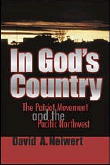Spyhopping the Right.

David Neiwert is a freelance journalist based in Seattle. He is the author of Strawberry Days: How Internment Destroyed a Japanese American Community (Palgrave/St. Martin's Press, June 2005), as well as Death on the Fourth of July: The Story of a Killing, a Trial, and Hate Crime in America, (Palgrave/St. Martin's, 2004), and In God's Country: The Patriot Movement and the Pacific Northwest (1999, WSU Press). His reportage for MSNBC.com on domestic terrorism won the National Press Club Award for Distinguished Online Journalism in 2000. His freelance work can be found at Salon.com, the Washington Post, MSNBC and various other publications. He can be contacted at dneiwert@hotmail.com.

Sara Robinson has worked as an editor or columnist for several national magazines, on beats as varied as sports, travel, and the Olympics; and has contributed to over 80 computer games for EA, Lucasfilm, Disney, and many other companies. A native of California's High Sierra, she spent 20 years in Silicon Valley before moving to Vancouver, BC in 2004. Her lifelong interest in the social effects of authoritarianism have most recently led her to pursue the MS in Futures Studies at the University of Houston. She's also a student member of the Association of Professional Futurists, and member of the Accelerated Studies Foundation advisory board on social and cultural issues. For fun, she raises kids and travels. You can reach her at srobinson@enginesofmischief.com.
Sara's recent series:
Cracks in the Wall: Parts I, II, and III.
Tunnels and Bridges: Parts I, II, III, and IV, plus a Short Detour.
Dave's recent series:
The March of the Minutemen
Intro: Parts 1, 2, 3, 4, 5, and 6.
Unhinged: Unhonest
Parts 1, 2, 3, 4, 5, and 6.
___
Other books by Dave [limited availability]:


"The Rise of Pseudo Fascism": An essay
Available in Adobe PDF format here
Support independent journalism:
Suggested $5 donation

Original posts: Part 1, Part 2, Part 3, Part 4, Part 5, Part 6, and Part 7.
______
Choice essays:
____
"The Political and the Personal"
____
"Bush, the Nazis and America":
Parts 1, 2, 3, and 4.
_______
Rush, Newspeak and Fascism: An Exegesis
[PDF file]
[Suggested $5 donation]
[In HTML: Parts I, II, III, IV, V, VI, VII, VIII, IX, X,, XI, XII, XIII, XIV and XV. See explanatory note.]
[Also available in HTML, and with art, at Cursor.]

_______
Orcinus Principium No. 1
Orcinus Principium No. 2
Why Orcinus?
|
|
| |
|
|
| |
|
|
|
|
|
|
| |
Quote of the day
Saturday, November 08, 2003
Looks like the Bush Doctrine's pre-emptive invasion mindset is expanding its horizons:
- Further, it could well be argued that we have done the Iraqi people a huge service. We have liberated them and are now showering them with new schools, hospitals, electrical grids and fresh drinking water. There are plenty of countries around the world that would welcome a U.S. invasion.
-- Mona Charen
9:10 AM
Spotlight
Another view on the rural problem
Friday, November 07, 2003
Confirmation is always a nice thing.
Today, Paul Krugman weighs in with pretty much the same assessment of the Democratic candidates' shameful behavior on the Confederate flag issue, though of course from an economist's perspective:
- Flags Versus Dollars
Krugman adroitly points out the ridiculousness of rural Americans supporting the Bush agenda, particularly from a fiscal point of view. And he agrees that the thrust of Dean's remark was exactly on the money:
- Mr. Dean wasn't suggesting that his party adopt the G.O.P. strategy of coded racial signals, and by and large African-Americans — my wife included — understand that. What he meant by his flag remark was that Democrats must make the case to working Americans of all colors that the right's elitist agenda isn't in their interest. And he's right.
9:53 AM
Spotlight
Dean and the Confederate flag
Thursday, November 06, 2003
I know Howard Dean is supposed to be Web-savvy and tuned in to the blogosphere. But he would have saved himself some grief this week -- culminating in today's apology -- had he listened to the advice that a number of bloggers, myself included, offered when first he made allusions about courting "guys with Confederate flags on their pickup trucks."
I raised the issue back in March, when he first made the reference. As I argued then, the thrust of Dean's remark was uncannily accurate, since it indicates he understands why the Democratic Party has been losing ground to the GOP over the past 20 years. What was wildly off the mark was the way he couched the phrase, since it relied on a symbol that dredges up all kinds of poisonous beliefs and behaviors.
Even the official Dean campaign blog remarked on these concerns, and I commented further on the reasons for Dean to avoid using the Confederate flag. The discussion appeared to have an effect; Dean seemed to stop using the meme in his stump speeches. Then it popped up again, and this time his Democratic opponents were waiting to jump all over him for it.
What none of his opponents seemed to get, however, was that the thesis of the remark was precisely on the money, even if the terminology he used was inappropriate. None of them seemed prepared to tackle the issues Dean was raising.
As I argued back in March:
- His core point is not only worth making, I happen to consider it an absolutely essential ingredient for the long-term success of any Democratic candidate: Namely, that the party needs to return to its agrarian roots, re-establish the needs of American family farmers as a priority, and draw back into the party those working-class rural dwellers whose interests are most naturally served by a progressive agenda.
One of the reason that Democrats have succumbed to Republicans in rural states -- where they enjoyed broad support for much of the better part of the 20th century -- is that the party has become increasingly urban-centric. Much of this is the natural outgrowth of relying heavily on raw numbers for political calculation; there is a much larger voting bloc in the cities than in the country, and it's much more easily reached. Thus the Democrats have in recent years focused much of their agenda on attracting urban and suburban votes. They have done so at the cost of their own soul, I believe.
The death of rural America -- a brutal, slow, painful death by suffocation, as corporate agribusiness displaces the family farm -- should be a major issue for Democrats. The Jeffersonian ideal, recall, was an America built as a nation of "citizen farmers." It may be something of a myth, but it is one that is deeply imbedded in our national psyche, and it is not one we can just hastily dispose of like some overripe cantaloupe.
Republicans have made great headway in these states by pretending to be on their side -- mostly by wrapping themselves in red-white-and-blue rhetoric, and especially by waving the bloody shirt of hating the gummint, who by the GOP's lights has been solely responsible for the entirety of rural dwellers' miseries (this was how they managed to fleece them with the misbegotten Freedom To Farm Act of 1996, which should have been more accurately named the Giant Hogtrough For Corporate Agribusiness). Indeed, it's clear this is one of the chief purposes of the proliferation of anti-government tropes by the likes of Rush Limbaugh and his conservative cohorts: to separate working-class people from the very political presence most capable of actually protecting their long-term interests from the Enronesque predators of unfettered corporatism -- namely, the gummint.
Meanwhile, the Democrats have treated these issues as empty afterthoughts at best (Al Gore actually had a reasonably intelligent agriculture program, but you'd never have known about it from either the "invented the Internet" Washington press corps or from Al Gore himself). They have essentially ceded the field to the GOP, and are now paying the price.
And while Dean has been foremost in recognizing this -- he has prepared a thoughtful and thorough outline of his farm policy -- he is not alone. John Kerry, Dennis Kucinich and John Edwards (who was also the only one among his opponents to put his finger on what was wrong with Dean's remark: "The people I grew up with, the vast majority of them, they don't drive around with Confederate flags on pickup trucks") all have excellent policy outlines. Dick Gephardt, who has a mixed track record on farm issues, actually has a fairly vague outline. But Joe Lieberman, Al Sharpton, Carol Moseley Braun and Wesley Clark are all behaving like typical urban-oriented Democrats and neglecting the matter altogether.
Unfortunately, none of them have raised agricultural issues to the level needed to make any headway combating the Democrats' national image as congenitally out to lunch on rural concerns. Dean has been trying to do so, but with the misbegotten "Confederate flag" remark as a talking point. And the way Dean's opponents forced him into retreat on the remark without addressing his underlying point only confirms the Democrats' clueless status further.
What is especially unfortunate about this scenario is the way it has forced Dean to back away from his plea to return the Democratic Party to its agrarian roots.
And what's really remarkable is that the Republican Party -- particularly because of the way it the election in Mississippi played out -- had just provided these same Democrats with a big fat target, one certain to give them significant impetus in exposing the GOP's congenital racism, what Dean referred to as the way "the Republicans have been dividing us by race since 1968 with their Southern race strategy."
The results from Tuesday's election were even more grist for the mill. While the incumbent Democratic governor, Ronnie Musgrove, ran a spectacularly dumb campaign (running away from your party cuts you off from your base), more than a few Mississipians observed that the way Haley Barbour and the Republicans manipulated the issue of the Confederate flag, and his dalliances with white supremacists, throughout the campaign contributed to the outcome elsewhere. Of particular note were the outcomes in the races for lieutenant governor and state treasurer, as this AP report from Jackson attests:
- Rickey Cole, chairman of the Mississippi Democratic Party, said the GOP's tactics in this election season harked back to "Nixon's Southern Republican strategy to make subtle winks and nods to white racism in the South."
As another AP report points out, race almost certainly was a significant factor in the treasurer's race. The Democrat, Gary Anderson, 47, served in five gubernatorial administrations, worked in the banking industry and had previously served as the state's fiscal officer. The Republican, Tate Reeves, 29, has worked as a bank portfolio manager. That's it. He had no experience in state government or politics. But Reeves won by about the same percentage as Barbour, which suggests their voters closely tracked together:
- Merle Black, professor of politics and government at Emory University in Atlanta, Ga., said race seemed to be more of an issue in the state treasurer contest.
"It's not a high profile race, but if it comes down to the crunch, then the white voters may prefer the white Republican candidate, even though the white Republican candidate is less qualified," Black said. "That's where race could clearly be a factor."
Where was our Uniter-Not-a-Divider-in-Chief? Down campaigning for Barbour, of course. And winking and nudging at his tactics:
- "I'm proud to stand with this man ... He's proud of this state, and that's the kind of governor you need — somebody who relates to people from all walks of life."
Meanwhile, did any of the Democratic presidential candidates who were eager to talk about the Confederate flag say a word about what was happening in Mississippi?
Well, no. They found it more convenient to beat up on their party's front-runner by distorting, and ignoring, the thrust of his remarks. And thereby losing another opportunity.
The GOP is ripe to be exploited for its behavior in Mississippi, though the issue could backfire if Democrats continue to behave as they have. What's more important is that the Democratic Party is long overdue to do the right thing and stand up for its base, including the African Americans who are the target of this brand of politics. It will be interesting to see which of the candidates is the first to figure this out.
[Update: John Nichols has an excellent piece in The Nation on the need for a cohesive rural strategy for Democrats.]
6:34 PM
Spotlight
|
|
| |
|
|
|